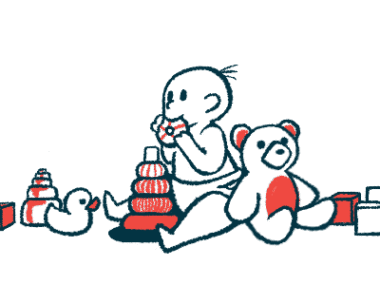Add-on Epidiolex Reduces Convulsive Seizures in Dravet Syndrome Patients, Phase 3 Trial Shows
Written by |

Add-on oral treatment with Epidiolex (cannabidiol) significantly lowered the frequency of convulsive seizures in patients with Dravet syndrome, according to topline results of a Phase 3 clinical trial.
The study (NCT02224703) was the second double-blind, placebo-controlled Phase 3 clinical trial of GW Pharmaceuticals’ Epidiolex in the treatment of Dravet-associated seizures. It included 199 patients ages 2-18 (average age 9) and currently uncontrolled on one or more concomitant anti-epileptic medications (AEDs). On average, the patients were taking three AEDs and had discontinued four other such therapies.
The patients were randomly assigned to add-on treatment with Epidiolex at 20 mg/kg/day (67 patients), 10 mg/kg/day (67) or placebo (65). Epidiolex’s dose was adjusted during the first two weeks, then maintained for 12 weeks. The median monthly baseline convulsive seizure frequency was 12, while median total seizure frequency per month was 35.
Results showed that, over the 14-week treatment period, patients on the higher dose had a 46% reduction in convulsive seizures. In turn, those on the lower dose achieved a 49% decrease, while patients taking a placebo had a 27% reduction. Both dose levels provided a statistically significant improvement compared to the placebo.
Key secondary efficacy results further supported the benefits of Epidiolex. A 50% or greater lessening of total seizures was found in 49% of patients taking 20 mg/kg/day, 44% of patients taking 10 mg/kg/day, and 26% of those on a placebo. Analysis of Caregiver Global Impression of Change also showed that Epidiolex was superior to a placebo.
Matching its U.S. prescribing information, the most frequent adverse reactions in patients taking Epidiolex (10% or greater than placebo) were somnolence and sleep impairment, loss of appetite, diarrhea, elevations in transaminase (a liver enzyme), fatigue, malaise, and asthenia; rash, and infections. GW plans to present detailed trial results at a medical conference and publish them in a medical journal.
Epidiolex is a purified form of cannabidiol, the most abundant non-psychoactive cannabinoid compound in the cannabis plant. It acts on brain receptors, which, when faulty, can cause seizures. Recently, the medication became available in the U.S. as a treatment for seizures in patients age 2 and older with Lennox-Gastaut syndrome (LGS), also a rare and severe form of childhood-onset epilepsy, or Dravet. It is being marketed by GW subsidiary Greenwich Biosciences. It was approved by the U.S. Food and Drug Administration (FDA) in June 2018.
“The positive outcome in this second trial of Epidiolex in patients with Dravet syndrome further reinforces the effectiveness of this newly available medicine in this particularly difficult-to-treat, childhood-onset epilepsy,” Ian Miller, MD, a principal investigator in the study and director of the Epilepsy and Neurophysiology Program at Nicklaus Children’s Hospital, in Miami, said in a press release.
Overall, the Phase 3 data of Epidiolex have shown “clinically meaningful seizure reductions and a consistent safety and tolerability profile,” Miller said.
Justin Gover, GW’s CEO, said: “These data show an effective dose range in Dravet syndrome that is consistent with our FDA-approved label, and which allows for dosing flexibility to address individual patient needs.
“We are proud to have recently launched Epidiolex, the first FDA-approved plant-derived cannabinoid medicine and are excited about its potential to help the lives of patients and their families.”
Mary Anne Meskis, the Dravet Syndrome Foundation’s executive director, said the results are “good news for the Dravet syndrome community” and represent “further scientific evidence” for Epidiolex. “As the first FDA-approved medicine for patients with Dravet syndrome, Epidiolex offers hope to individuals who previously had few options available to effectively control their seizures.”
Philip M. Gattone, the Epilepsy Foundation’s president and CEO, said the results “are very encouraging” for patients with LGS or Dravet. He added that the findings provide “hope to the most vulnerable individuals in our epilepsy community who are trying to gain better seizure control.”
Overall, the trial adds to other Phase 3 studies on Epidiolex in LGS and Dravet (NCT02091375 and NCT02224560), as well as an open-label extension study (NCT02224573), which showed that the medication reduced convulsive seizures by 38-44% and all seizures by 39-51%. Epidiolex also improved overall health and clinical status in approximately 80% of patients at six months and one year of treatment.




